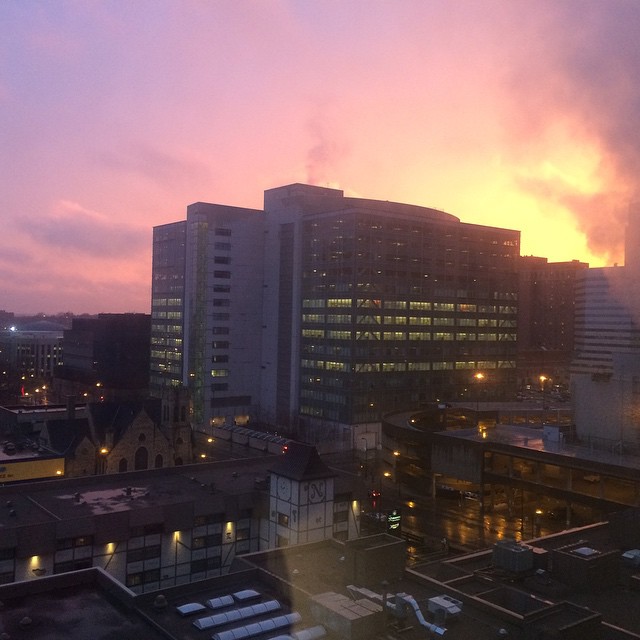–by Shannon Reed
In the weeks leading up to my first AWP conference, I heard a great deal of advice. Although much of it turned out to be helpful, the words “strategize” and “survive” were so often included, I began to think of my trip to Minneapolis as a minor campaign in a small, bloodless war. Get in. Get free bookmarks. If the battlefield is clear, maybe snag a free tote bag. Avoid the panels. And then, get out. As it turned out, I enjoyed the conference a great deal more than I expected – the free tote bags guy at the London Review of Books was really nice! – but I also came away more concerned about the inclusivity of the world that AWP gathers together.
Much has been written about the representation (or lack thereof) of writers of color and LGBTQ writers at AWP, and, from my limited perspective, the concern seems justified. Here, though, I want to point to another area I worry about, one that I am better equipped to speak to: the way the conference actually unfolds, which leads to a prioritizing of one kind of communication and learning over all others.I’m a former high school English teacher turned MFA candidate and college professor. I write and read widely, and, despite a passion for theatre, music, TV and film, I choose to get my information from the written word whenever possible. That may sound like the perfect AWP participant, but AWP favors audio learners: just think about the panels, of which many, including the one I ran, lack any visual component; the book fair, which does offer visual and tactical components, of course, but which usually defaults to audio discussion; and the convention space itself which, while large and well-kept, also provided the majority of the opportunities to gain information through conversation with personnel. No wonder people say AWP serves the outgoing folks among us best.
If you’re thinking, well, yes, that’s how conferences work, you’re absolutely correct. So, too, do airports, train stations, concerts and many other locations where people gather. AWP is not out of line with the culturally accepted way of conducting this type of event.
But I’m not sure that being in line is good enough. I’m not just someone who prefers to read for information, but someone who really needs to do so, because I’m hearing impaired. Although I have perfectly good social skills and am a bit of an extrovert at times, it was frustrating to navigate AWP. The tight schedule meant that I couldn’t always get into a room early to sit near the front and read the panelists’ lips. The book fair provided a plethora of information, but when I approached the tables for literary magazines I was interested in writing for, I had to hope that the folks there didn’t mind if I asked them to repeat themselves. There weren’t microphones for the audience’s questions at my panel, so another person on it had to handle the questions. And forget going to the large readings: there was no way I would able to arrange to sit close enough.
AWP does provide accessibility services, but I didn’t see anyone using them, and, as is so often the case for disabled people, I was embarrassed to draw attention to myself by requesting them.
More, I hadn’t realized until I got there that I would need them, and requests were due months before. I’ll know next time that a strategy is needed; not just the those advised by my friends and colleagues, but a plan based on what I can and can’t do. It’ll take more work, sure, but I want to take advantage of all that AWP has to offer, so I’ll just have to make the time.
I’m 40, but it’s worth noting that approximately 40% of the population will be hearing impaired by the time they’re in their 60’s. A hearing-impaired friend of mine calls the disability “the struggle you don’t know you’re going to face yet.” One of the wonderful things about AWP was seeing a wide range of ages enjoying the conference together, yet I wondered how many of the events were accessible to people who had trouble walking, hearing, seeing and so on, problems that increase as we get older.
I also wondered about how the kids I taught in high school would fare at AWP. Of course, many would have loved the abundance of text or flourished in a world of audio learning. But the others – those that learn best by touching, moving, reading, seeing – how would they have fared? What would they have taken away from AWP? Or would they simply have left, to take a walk to the Mississippi or a turn through the Walker Art Gallery, to fall into a long conversation with a bartender at The Newsroom, or to swim laps in the hotel pool? Would it have been such a bad thing if they did those things? No, of course not.
But it’s also worth working through the question: if AWP is meant to represent our industry, our business, even our passion, then what does it say that we’re only accessible to a certain kind of learner, and a certain type of person? Is AWP only for people who hear well and converse easily? Or is it for everyone who loves or might come to love words, sentences, books, writing?
***
Shannon Reed just finished her MFA in Creative Writing: Fiction at the University of Pittsburgh, where she also taught. Her credits include McSweeney’s Internet Tendency, Buzzfeed, HelloGiggles, Vela, Narratively, the Kweli Journal, Litro Fiction and the Mud Season Review. You can learn more about her work at her website, www.shannonreed.org.
![[PANK]](http://pankmagazine.com/wp-content/themes/pank/assets/images/pank-logo-large.png)

